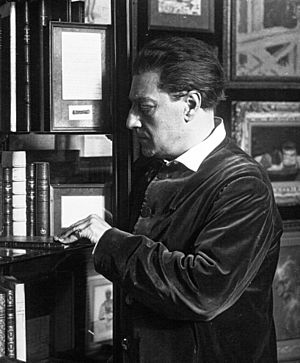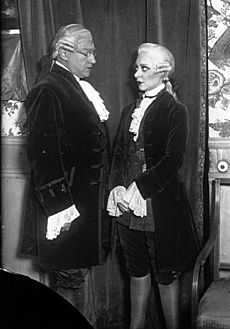Sacha Guitry facts for kids
Sacha Guitry (born Alexandre-Pierre Georges Guitry) was a very famous French actor, director, and writer. He was born on February 21, 1885, and passed away on July 24, 1957. Sacha came from a family of actors; his father, Lucien Guitry, was also a well-known actor. Sacha became very famous for his acting on stage, especially in a type of theater called "boulevard theatre." He wrote a lot of plays, over 100 of them! He also helped many actresses become famous, including his wife, Yvonne Printemps.
His plays were very different, from historical stories to funny comedies. Some even had music by famous composers like André Messager and Reynaldo Hahn. At first, Sacha didn't like silent films because they didn't have talking. But later, in the 1930s, he loved making movies and sometimes made five films in just one year!
Towards the end of his life, Sacha faced some difficult times. After World War II, some people thought he had been too friendly with the German occupiers. These claims were later found to be untrue, and he was cleared. Sacha was a very patriotic person, and these accusations made him sad. However, by the time he died, people remembered him fondly. About 12,000 people came to see his coffin before he was buried in Paris.
Contents
Life Story and Career
Early Life and First Steps on Stage
Sacha Guitry was born in Saint Petersburg, Russia, on February 21, 1885. He was the third son of French actors Lucien Guitry and Marie-Louise-Renée Delmas de Pont-Jest. His parents had moved to Russia because his father ran a French theater company there. Sadly, two of Sacha's brothers died when they were babies. His other brother, Jean, became an actor and journalist.
Sacha's Russian nurse used to call him "Sacha," which is a shorter version of Alexandre-Pierre. He was known by this name his whole life. Sacha first acted on stage with his father's company when he was just five years old!
His father, Lucien Guitry, was a very successful and respected actor in France. When his family moved back to Paris, they lived in a fancy apartment. Sacha went to several schools but didn't stay long at any of them. He decided to stop formal schooling when he was sixteen.
After leaving school, Sacha started writing plays. His first small musical play, Le Page, was shown in 1902. A year and a half later, he joined his father's acting company. He used a different stage name at first, "Lorcey," but everyone quickly figured out who he was. His first big acting role was in a play called L'Escalier in 1904. He and his father had a disagreement because his father thought Sacha wasn't serious enough about acting. After their argument, they didn't see or speak to each other for a while.
A young actress named Charlotte Lysès was also in his father's company. In 1905, Sacha and Charlotte started living together. He wrote a play for her called Le KWTZ. In the same month, he had his first big success with a play called Nono. In 1906, the main actor in his play Chez les Zoaques got sick, so Sacha stepped in and acted in it himself. People said he was the best person to play the role. From then on, he was an actor, writer, and later a theater manager for the rest of his life.
Becoming Famous
For the next five years, Sacha's plays had some success, but then he had five big hits in a row! These plays included Le Veilleur de nuit (1911), Un Beau mariage (1912), Le Prise de Berg-op-Zoom (1912), La Pèlerine écossaise (1912), and Les Deux converts (1914). The last one was even performed by the famous Comédie-Française theater.
In 1915, Sacha made his first short film, Ceux de chez nous. It was a patriotic film that celebrated important French people like Sarah Bernhardt, Claude Monet, and Auguste Rodin. He didn't really like silent films because he thought talking was the most important part of a play. He didn't make a full-length movie until 1935. In 1915, he met a young singer named Yvonne Printemps. They started a relationship, which led to Charlotte leaving him and getting a divorce. Sacha began writing main roles for Yvonne, some with music and some as comedies.
Working with Yvonne Printemps
Sacha and his father made up in 1918. Lucien, Sacha, and Yvonne Printemps acted together in many plays, including Mon Père avait raison. They performed not only in Paris but also in London. A famous actor named John Gielgud said that Yvonne and Sacha often came back to London to entertain audiences with plays Sacha wrote especially for them.
Sacha became known for his charming and witty acting style. He often appeared in funny historical comedies. For example, in 1925, he created a play called Mozart. It was about the young composer Wolfgang Amadeus Mozart visiting Paris. Sacha asked Reynaldo Hahn to write the music for it. The play wasn't completely historically accurate, but it was very popular. Yvonne Printemps played the young Mozart, dressed in boy's clothes, and Sacha played Mozart's supporter, Baron Grimm. John Gielgud remembered Yvonne looking lovely and young in her wig and costume, while Sacha stood by her, speaking his lines in a deep, smooth voice. After a successful run in Paris, they took the play to London and then to New York, Boston, and Montreal in 1926 and 1927. They returned to the US and Canada in 1929.
In 1931, Sacha Guitry received a special award called the Legion of Honour. The next year, he celebrated 30 years on stage with a big dinner. Later in 1932, his marriage to Yvonne Printemps ended. He took a break from the theater for six months. In 1933, he returned to the stage with a new play, Châteaux en Espagne, which starred his new talented actress, Jacqueline Delubac. He married her on his fiftieth birthday. During the 1930s, he started focusing on making movies again, as a writer, director, and actor, but he still continued his theater work. In 1936 alone, Sacha made five films and wrote five plays! One of these plays was his 100th play, Le Mot de Cambronne.
Later Years and Legacy
In 1938, Sacha wrote a short play for the visit of King George VI of the United Kingdom to Paris. The play was performed for the King and Queen. When the French President visited London the next year, Sacha wrote a short comedy in English called You're Telling Me. He and another actor, Seymour Hicks, starred in it.
As World War II was starting, Sacha did something very important. In August 1939, while visiting London, he helped smuggle a copy of an Enigma machine (a secret code machine) to Bletchley Park in England. This machine was crucial for breaking German codes during the war.
His next play, Un Monde fou, was the last one to feature Jacqueline Delubac. She left him because she found it hard to live with someone who worked so much and was often jealous. A few months after she left, he married for the fourth time. His new wife was Geneviève de Séréville, who had been in one of his plays in London.
Sacha Guitry's career was affected by the German occupation of France during the war. He continued to work in theater and film during this time. While this allowed him to help many French people, it also led to some people accusing him of being too friendly with the occupiers. He created a book and film called De 1429 à 1942 ou De Jeanne d'Arc à Philippe Pétain ("1429 to 1942, or Joan of Arc to Philippe Pétain"). He meant it as a tribute to France's history, but some saw it as supporting the leader of Vichy France, Philippe Pétain, who worked with the Germans. In 1944, his fourth wife left him.
When France was freed from German control, Sacha was among the first people arrested by the French Resistance. He was held in a camp and became ill, needing to be moved to a nursing home. The accusations against him were later dropped because there wasn't enough proof. This experience made him feel very sad and disappointed.
In 1947, Sacha married for the fifth and final time. He was sixty-two, and his wife, Lana Marconi, was twenty-eight. He was allowed to start working in the theater again in 1948. For the celebration of Queen Elizabeth II's coronation in London in 1953, Sacha starred in a comedy called Ecoutez bien, messieurs. Later that year, he made his last stage appearance in Paris. He continued to make films until 1957, when he became very ill with a nervous system disease.
Sacha Guitry passed away in Paris at the age of seventy-two. Many people, about 12,000, came to see his coffin. He was buried, like his father, in the Montmartre Cemetery in Paris.
Selected Films
| Year | Film | Actor | Director | Screenwriter | Notes |
|---|---|---|---|---|---|
| 1936 | The New Testament | Yes | Yes | Yes | |
| 1936 | Le roman d'un tricheur | Yes | Yes | Yes | |
| 1936 | My Father Was Right | Yes | Yes | Yes | |
| 1936 | Let's Make a Dream | Yes | Yes | Yes | |
| 1937 | Désiré | Yes | Yes | Yes | |
| 1937 | The Pearls of the Crown | Yes | Yes | Yes | |
| 1938 | Quadrille | Yes | Yes | Yes | |
| 1938 | Remontons les Champs-Élysées | Yes | Yes | Yes | |
| 1949 | Aux deux colombes | Yes | Yes | Yes | |
| 1951 | La Poison | Yes | Yes | ||
| 1954 | Royal Affairs in Versailles | Yes | Yes | ||
| 1955 | Napoléon | Yes | Yes | ||
| 1956 | If Paris Were Told to Us | Yes | Yes | ||
| 1956 | Assassins and Thieves | No | Yes | Yes | |
| 1996 | Beaumarchais | Yes | |||
| 2001 | A Crime in Paradise | Yes |
Plays Made into Films by Others
- The Lover of Camille, directed by Harry Beaumont (USA, 1924, based on the play Deburau)
- Sleeping Partners, directed by Seymour Hicks (UK, 1930, based on the play Let's Make a Dream)
- Black and White, directed by Marc Allégret and Robert Florey (France, 1931, based on the play Le Blanc et le Noir)
Images for kids
See also
 In Spanish: Sacha Guitry para niños
In Spanish: Sacha Guitry para niños
- Plays and films of Sacha Guitry
 | Valerie Thomas |
 | Frederick McKinley Jones |
 | George Edward Alcorn Jr. |
 | Thomas Mensah |




